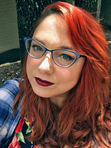National Poetry Month: Guest Post from Carol Rosenfeld: The Poet in Our Divided World
Recently I was asked to moderate the poetry panel at the 12th Annual Saints and Sinners Literary Festival, which was part of the larger Tennessee Williams Literary Festival in New Orleans this year, and I agreed. Then I was asked to write the description.
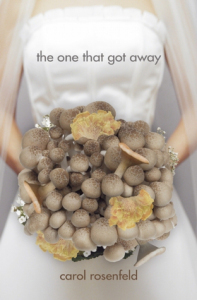
Bywater Books, June 2015.
I had an idea, but I couldn’t seem to articulate it in a way that satisfied me, which is what writing poetry is like for me, come to think of it. I kept thinking about the bewilderment I felt over events reported in the news, how I kept trying to map out the path that had led humanity to the place where we are now. Eventually I came up with the following:
“The Poet in Our Divided World. Poets, through their unique voices, can play many roles: healer, citizen, teacher, herald, the fool speaking truth to the king. Our world in tumult is in need of the poet’s counsel more than ever. How can poets make the greatest impact with their words?”
I was fortunate in my panelists: Scott Bailey (THUS SPAKE GIGOLO), Saeed Jones (PRELUDE TO BRUISE), Kay Murphy (Professor Emeritus at the University of New Orleans), and Brad Richard (HABITATIONS, MOTION STUDIES and BUTCHER’S SUGAR).
On March 23, five days before the panel was going to take place, and two days before I left for New Orleans, I stumbled across an essay by Toni Morrison in The Nation, entitled “No Place for Self-Pity, No Room for Fear.” I opened the panel by reading from the essay. Morrison had written about feeling depressed and helpless, unable to write, after the presidential re-election of George W. Bush in 2004. A friend had called her, and hearing her talk about her dark mood, had responded: “No! No, no, no! This is precisely the time when artists go to work—not when everything is fine, but in times of dread. That’s our job!”
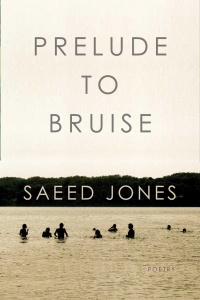
Coffeehouse Press, September 2014.
I asked the panelists to comment. Brad Richard said that poets needed to “get in people’s faces about things that need to be said.” Kay Murphy said she had thought of the line, “Writing poetry is a political act.” Saeed Jones remarked, “My work is not separate from my life,” and went on to say, “Poetry serves to make sense of the unspeakable,” adding that “journalism and prose-writing can’t always go there.” And Scott Bailey said that “poetry shapes thought, which shapes culture.”
I had invited each poet to bring two poems: one of their own, that they would like to read to another person—a politician, a family member, a student, for example—in the hope of making them see or think differently about something, and a poem written by another poet that made them think differently about something—an event, a person, a place, a belief.
Scott Bailey read “Exit Ramp 69 in Edenville, MS” from his book, THUS SPAKE GIGOLO, and then read excerpts from Walt Whitman’s “Song of Myself.”
Saying that “We need to begin to think as critically about law as we have about art,” Saaed Jones spoke about the inspiration for his poem “Don’t Let the Sun Set on You,” from his book PRELUDE TO BRUISE. Jones said he had read an article on “sundown towns”—referring to towns with signs posted stating people of color (the actual signs used a different term) had to leave the town by sundown. Saeed also read Shira Erlichman’s poem, “When I Woke Up to a Woman Screaming Help Out the Window and a Car Door” from the online journal, Winter Tangerine.
Kay Murphy read one of her own poems and one by Jenny Factor, from her book UNRAVELING AT THE NAME
Brad Richard said that his first poem, “Eye-Fucked,” about the murder of Nicholas West (from BUTCHER’S SUGAR) was about hate, and the second poem, “You, Therefore” by Reginald Shepherd (from FATA MORGANA), was about love, and that he would read both of them to Governor Mike Pence of Indiana.
Toward the end, I raised the question of people’s perception of poetry as something esoteric.
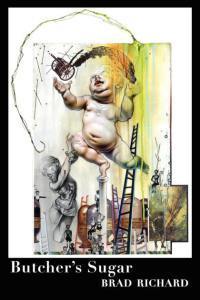
Sibling Rivalry Press, October 2012.
Brad Richard, speaking from his experience as chair of the creative writing program at Lusher Charter High School, suggested that we start teaching poetry to students early on. He said his students loved poetry—but he also knew of teachers who did not include it at all.
Saeed Jones saw part of the problem as being poets who only talk to other poets; he thought we needed to find opportunities to bring poetry into our cultural conversations. I think the Write All the Words! National Poetry Month guest blogs are one way of doing that.
Kay Murphy was troubled by what she saw as the “mental masturbation” that some young poets think of as poetry. Scott Bailey chimed in, comparing it to American idol. Bailey also said it was important to be aware of and to be shaped by literary predecessors.
Although I appreciate what Murphy and Bailey said, it seems to me that all writers and poets have to start somewhere. Bailey spoke of his work with patients at St. Mary’s Hospital for Children, as well as his work with prisoners, how when they see their voice, their words on the page, it validates their existence. The first step in the process is to put pen to paper. That can open the door to developing your craft through reading and learning from other poets.
While I was working on this blog I read in the Poets House March 2015 newsletter, in A Note from the Poets House Executive Director (Lee Briccetti), “…I have encountered many people who cling to a prayer, a song, or a line of verse as if it were their last handhold on a cliff…even though they swear not to like poetry.”
Poetry is powerful. We hunger for it, though we may not recognize that it is poetry we want.
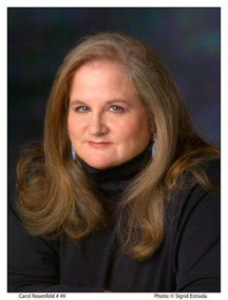
Carol Rosenfeld.
Carol Rosenfeld is an accomplished short fiction writer and poet—though it’s been a while since she participated in a poetry slam. Soon Bywater Books will be publishing THE ONE THAT GOT AWAY, the first novel by this writer described as “A fruit cup in the whole-grain world of literary fiction”. A Juris Doctor (she studied at night school!), she is kept very busy as the voluntary chair of the Publishing Triangle, which has been promoting LGBT literature since 1988. And that’s when she’s not at her day job, working for an organization that administers grants for the many colleges in the City University of New York.
She’s lived in New York since 1976, and can often be found at the opera—she has a growing fascination for Wagner (and quite a few questions, too).






